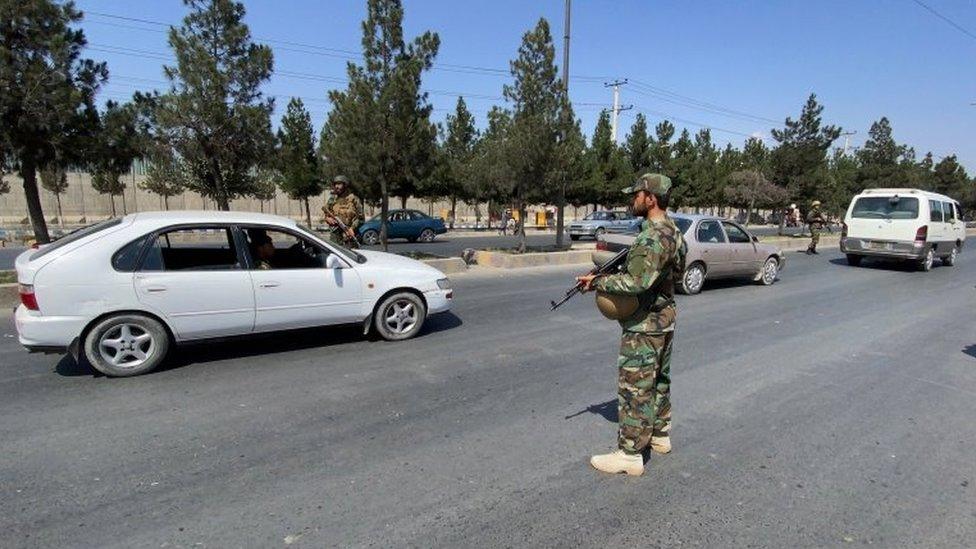Afghanistan: Don't recognise Taliban regime, resistance urges
- Published
A group of women protest in Kabul against the all-male Taliban government
Anti-Taliban forces in Afghanistan have asked the international community not to recognise the new government announced by the Islamists on Tuesday.
The all-male cabinet consisting entirely of Taliban leaders or their associates is "illegal", they said.
The US has expressed concern that the interim government includes figures linked to attacks on US forces.
And the EU said the Islamist group had reneged on promises to make it "inclusive and representative".
The interim cabinet is led by Mullah Mohammad Hassan Akhund, who is on a UN blacklist. Another figure, Sirajuddin Haqqani, is wanted by the American FBI.
The National Resistance Front (NRF) said it considered the announcement of the Taliban's caretaker cabinet "a clear sign of the group's enmity with the Afghan people".
The Taliban insist they have now defeated the NRF in the Panjshir Valley north of Kabul, but NRF leaders say they are still fighting.
In a statement, the US state department said it was concerned by the "affiliations and track records of some of the individuals".
The statement said Washington would "continue to hold the Taliban to their commitments" to allow safe passage for foreign nationals and Afghans with travel documents, "including permitting flights currently ready to fly out of Afghanistan".
US Secretary of State Antony Blinken is to hold a virtual meeting of 20 Western nations to co-ordinate a set of conditions for engagement with the Taliban government.
The Taliban seized control of Afghanistan in a sweeping offensive more than three weeks ago. It now faces many tough challenges in the conflict-torn country, including stabilising the economy and gaining international recognition.
On Wednesday dozens of women marched in Kabul and in the province of Badakhshan, saying they would not accept a government without women.
The Taliban deny using violence against the demonstrations. They say protesters need permission to march and should not use abusive language.
Pakistan also denies any role in Afghanistan.
Ministers told to implement 'Islamic law'
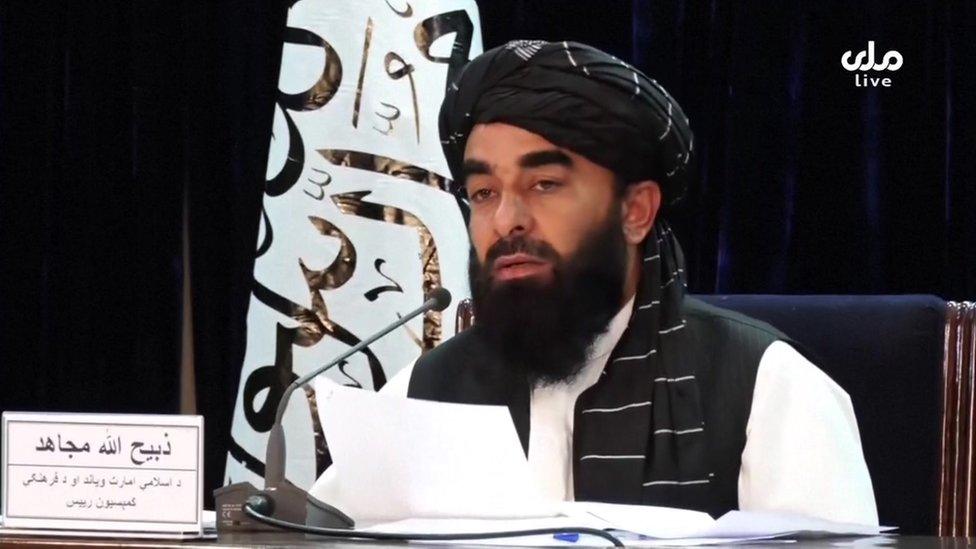
The Taliban's spokesman announced the appointments at a press conference
Earlier on Tuesday, a statement attributed to Taliban Supreme Leader Mawlawi Hibatullah Akhundzada told the government to uphold Sharia law - Islam's legal system. The Taliban have been known for their extremely hardline interpretation of Sharia.
The Taliban want "strong and healthy" relations with other countries and would respect international laws and treaties as long as they did not conflict with "Islamic law and the country's national values", the group's statement said.
Hassan Akhund, the new interim prime minister, served as deputy foreign minister from 1996 to 2001, when the militants were last in power. He is influential on the religious side of the movement, rather than the military side.
His appointment is seen as a compromise, after recent reports of in-fighting between some relatively moderate Taliban figures and their hardline colleagues.
The group had previously said it wanted to form an inclusive government.
Interior minister on US terrorism list
Sirajuddin Haqqani, the acting interior minister, is head of the militant group known as the Haqqani network, who are affiliated with the Taliban and have been behind some of the deadliest attacks in the country's two-decade-long war - including a truck bomb explosion in Kabul in 2017 that killed more than 150 people.
Unlike the wider Taliban, the Haqqani network has been designated a foreign terrorist organisation by the US. It also maintains close ties to al-Qaeda.
The FBI says he is wanted for questioning over a 2008 attack on a hotel that killed an American and was behind attacks on US forces in Afghanistan.


A movement which has long moved in the shadows, whose names would surface only on the world's terrorism watch lists, is now announcing titles used in governments the world over.
Acting prime minister Mullah Akhund appears as a compromise candidate after reported rivalries among leading military and political figures who will serve under him.
Its caretaker nature also provides breathing space as the Taliban move from guns to government.
It also underlines the Taliban view that a Taliban victory can only mean Taliban rule. Sources say they pushed back against calls for an "inclusive" government. They balked at including former political figures and officials, who've had their turn at the top, and especially those tainted by corruption.
"Why should we let others pick our cabinet when other countries pick their own? "was one retort.
As for women, there was never a chance they would be given a ministerial role; the ministry of women's affairs seems to have been, for now, abolished altogether.

Other appointments to the new government include:
Mullah Yaqoob as acting defence minister. He is the son of Taliban founder and late supreme leader Mullah Omar
Taliban co-founder Mullah Abdul Ghani Baradar will be one of the PM's deputies. He oversaw the signing of the US withdrawal agreement last year
Amir Khan Muttaqi, an interim foreign minister, also took part in the withdrawal talks
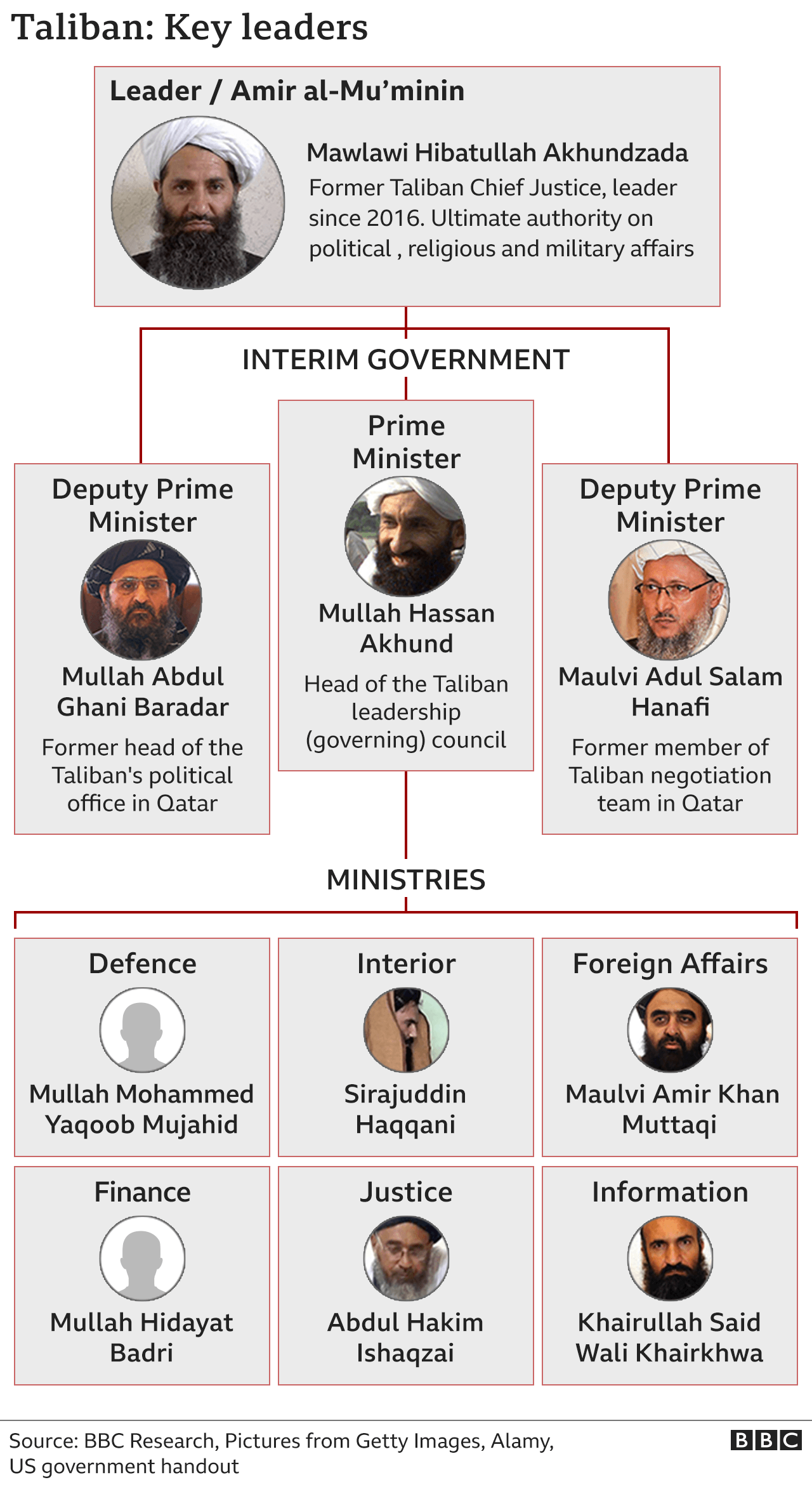

- Published7 September 2021
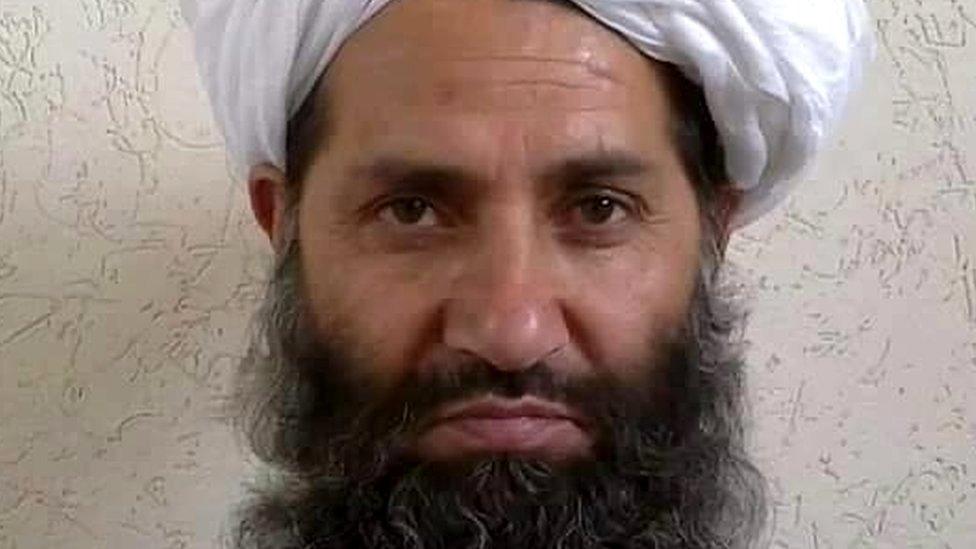
- Published5 September 2021
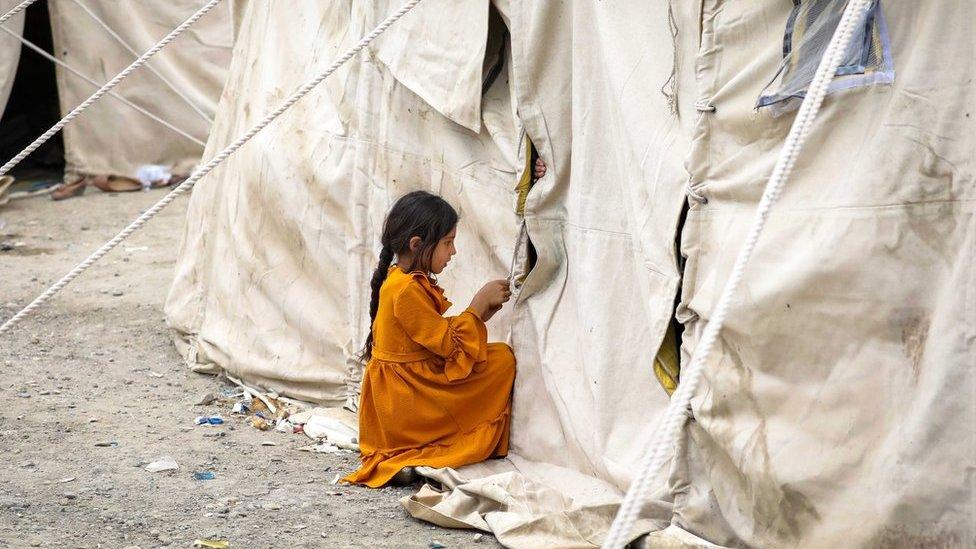
- Published5 September 2021
